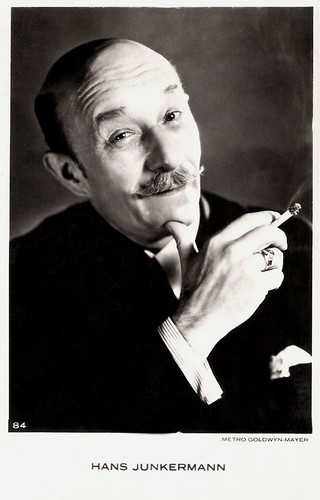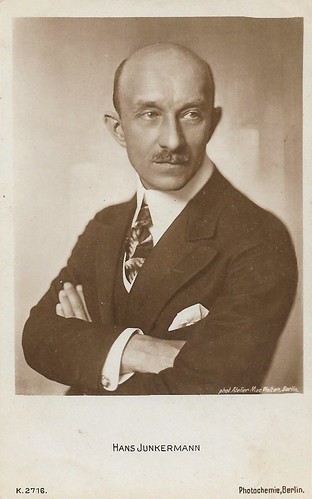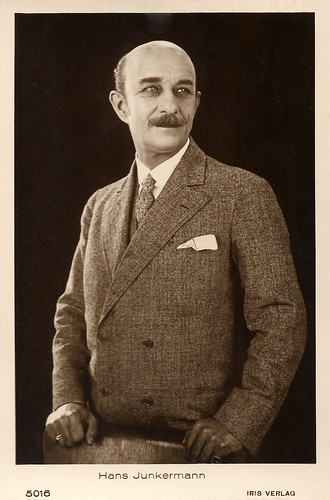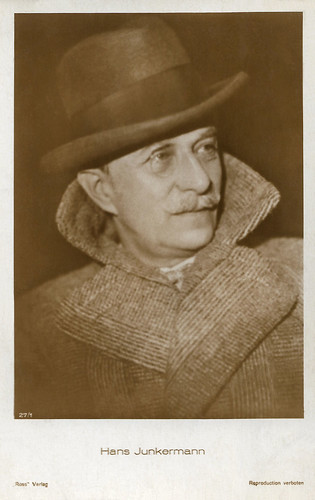
Dutch postcard, no. 84. Photo: Metro-Goldwyn-Mayer.

German postcard by Photochemie, Berlin, no. K.2716. Photo: Atelier Mac Walten, Berlin.

Dutch postcard by City Film, no. 464. Marta Eggerth and Hans Junkermann in Traum von Schönbrunn/Dream of Schönbrunn (Johannes Meyer, 1932). Sent by mail in 1934.
Aristocrats, high-ranked military, circus managers and police commissioners
Hans Ferdinand Junkermann was born in 1872 in Stuttgart. He was the son of the court actor August Junkermann and his wife, the actress Rosa Le Seur. His brother Fritz Junkermann was also an actor. Hans graduated from high school and joined his father's touring theatre company after dropping out of his studies at a military pedagogy school in Berlin.
This was followed by a theatre tour of the USA and his debut in the play 'Onkel Bräsig' by Fritz Reuter in 1893 at the Zentral-Theater Berlin, where his father had taken over the management. Junkermann's other stations as a theatre actor were the Thalia Theatre in Hamburg in 1895, the Weimar Theatre, the Court Theatre in Wiesbaden and from 1896 the Thalia Theatre in Berlin. From 1902 to 1915 he belonged to the ensemble of the Trianon Theatre.
In 1911 Hans Junkermann made his debut as a silent film actor in Vater und Sohn/Father and Son (Walter Schmidthässler, 1910) with Alwin Neuss for Vitascope. Director Max Mack engaged him in 1913 for the film Wo ist Coletti?/Where is Coletti? (Max Mack, 1913). After the film became a success, he got many other offers to play in films, so Hans Junkermann decided against the theatre and cancelled his contract with the Trianon theatre. He limited himself to guest appearances at Berlin stages in the following years.
The lanky Junkermann, whose trademark was his moustache, developed into a busy supporting actor in German films. Thomas Staedeli at IMDb compares him to the American film comedian James Finlayson, an actor in many Laurel & Hardy films. Junkermann played Polonius in Hamlet (Heinz Schall, Svend Gade, 1921), the German film adaptation of the William Shakespeare play 'Hamlet' starring and produced by Danish silent film actress Asta Nielsen. He also played a supporting role in Maciste und die Tochter des Silberkönigs/Maciste e la figlia del re dell'argento/Maciste and the Silver King's Daughter (Luigi Romano Borgnetto, 1922), a German-Italian silent epic film starring Bartolomeo Pagano, and Helena Makowska.
He also appeared in the silent comedy Prinzessin Trulala/Princess Trulala (Erich Schönfelder, Richard Eichberg, 1926) starring Lilian Harvey, Dina Gralla and Harry Halm, and the silent comedy Durchlaucht Radieschen/Highness Radish (Eichberg, 1926-27) with Xenia Desni. In 1928 Junkermann had a rare starring role opposite Adele Sandrock in the comedy Serenissimus, der Vielgeliebte, und die letzte Jungfrau/Serenissimus (Leo Mittler, 1928). All in all, until 1930 Hans Junkermann acted in over 110 German silent films, often in supporting parts such as aristocrats, high-ranked military, circus and vaudeville managers, impresarios and police commissioners.

German collectors card by Ross Verlag in the series Vom Werden deutscher Filmkunst - Der Stumme Film, picture no. 123, group 43. Photo: Eichberg-Film. Lilian Harvey and Hans Junkermann in Die tolle Lola/Fabulous Lola (Richard Eichberg, 1927).

German collectors card by Ross Verlag in the series Vom Werden deutscher Filmkunst - Der Stumme Film, picture no. 199, group 43. Photo: Eichberg-Film. Werner Fuetterer and Hans Junkermann in Durchlaucht Radieschen/Highness Radish (Richard Eichberg, 1927).

Austrian postcard by Iris Verlag, no. 5016.

Austrian postcard by Iris-Verlag, no. 5115. Photo: P. Weber, Berlin.
In Hollywood with Greta Garbo
In 1930 Hans Junkermann appeared three times in Hollywood in German versions of American productions. The most famous is Anna Christie (Jacques Feyder, 1930), a German-language film adapted from the 1921 Eugene O'Neill play of the same title and he filmed following the release of the English-language original version of the same adaptation earlier the same year. Both versions feature leading actress Greta Garbo.
In the early years of sound films, Hollywood studios produced foreign-language versions of some of their films using the same sets and sometimes the same costumes, with native speakers of the language usually replacing some or all of the original cast. The German-language version of Anna Christie is one of the few that survives.
Back in Germany, he took over the management of the Schauspielhaus Steglitz from 1931 to 1934, and in 1933 he co-founded the film and stage club Kameradschaft der Deutschen Künstler. He was furthermore employed by Harry Piel for films such as Pipin der Kurze/Pipin, the short one (Carl Heinz Wolff, 1934) with Heinz Rühmann, and Artisten/Artists (Harry Piel, 1935) where he impersonated one of his most imposing roles.
In 1940 he received the appointment as a state actor. Hans Junkermann was on stage at Berlin theatres until the end, for example at the Theater am Schiffbauerdamm. His last appearance was in Akrobat schö-ö-ön/Acrobat Beau-eau-eautiful! (Wolfgang Staudte, 1943) at Charlie Rivel's side.
Fritz Junkermann died in Berlin in 1943 at the age of 71. His grave in the Heerstraße cemetery in Berlin-Westend has not been preserved. Junkermann was married to the actress Julia Serda from 1911 and was the stepfather of actress and photographer Charlott(e) Serda.

German postcard by Ross Verlag, no. 27/1 (?).

German postcard by Ross Verlag, no. 5508/1, 1930-1931. Photo: Metro-Goldwyn-Mayer.

German postcard by Film-Foto-Verlag, no. 6368/1, 1931-1932. Photo: Atelier Bieber, Berlin.
Sources: Thomas Staedeli (Cyranos), Wikipedia (German and English), and IMDb.
No comments:
Post a Comment